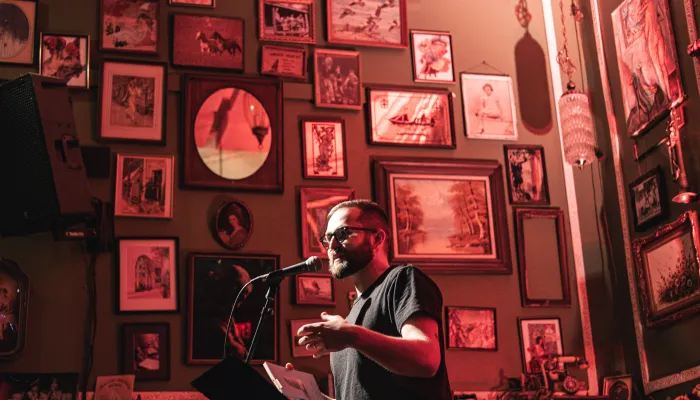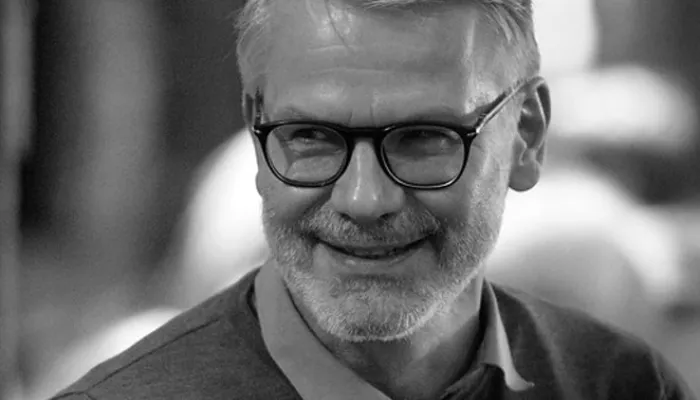Steven Ross Smith
Biography
Steven Ross Smith was Banff Poet Laureate 2018-21. He is a poet, fiction writer, and arts journalist, currently living in Victoria. His latest poetry books are Emanations: Fluttertongue 6, published by Book*hug in 2015, and the collaborative chapbook "coda: fluttertongue 7" from JackPIne Press in 2021. He was awarded the Saskatchewan Book of the Year Award for his poetry book fluttertongue 3: disarray in 2005, and won the bpNichol Chapbook Award for Pliny’s Knickers in 2006. His work appears in journals, recordings, and videos in Canada, USA, and abroad. Smith was Director of Literary Arts at the Banff Centre (2008–2014) and Director of Sage Hill Writing Experience (1990–2008). His writing is published in Grain and CV2. Smith’s poetic work is known for its innovative challenges to poetic form, notably in the seven-book long poem sequence Fluttertongue, and in his past performances of sound poetry. His latest book is "Glimmer: Short Fictions" (Radiant Press, 2022). A new publication - "The Green Rose" - a poetic collaboration with Phil Hall, appeared in 2024 from above/ground press. He has presented in classrooms, and at festivals and readings locally and internationally. Smith's work can be seen on his website at fluttertongue.ca, in indie bookstores, and on YouTube, and info can be found on Wikipedia and Google. You might find him walking by the ocean or in the woods around Victoria BC where he now lives.
Micro-interview
I did read poetry in high school because I had a terrific English teacher — Mr. Strebig — who made us read a lot of poetry and also recommended current fiction books. The poem that has stuck with me ever since is Gerard Manley Hopkins’ “God's Grandeur.” I’ve always loved the language play and the sounds in that poem. Here’s a sample from it: “Generations have trod, have trod, have trod: / And all is seared with trade; bleared, smeared with toil; And wears man's smudge and shares man's smell; ...” It's as relevant today as it was when he wrote it, which I believe, was in 1877.
I wrote my first poem in about 1967, after spending an afternoon with a Finnish girl that I had a crush on. It stirred some emotions in me and when I got home I decided to write something down. What came out and surprised me was a poem. I liked that. So, a while later I wrote another poem, then another. And I kept this up, but sporadically for a few years. Then in about 1971 I fell in with a small group of poets and we shared poetic enthusiasm. But it wasn't until the mid-’70s when I was about 30 and was writing regularly, that I could think of myself as a poet, and actually claim that, and when asked, say “I’m a poet.”
A poet’s job is to write poetry, and write consistently, like every day, or several times a week for one to four hours. Then another part of the job, for most poets, is to share their poetry, either though public readings, or in the context of poetic colleagues, or through publication in magazines or in book form. Part of the job too is to read poetry — all kinds, classic and contemporary — to continually develop an understanding of the art and the craft of poetry.
I don't have a poem in your anthology, but I believe that inspiration comes from perspiration - that is, sitting and writing whether you feel inspiration or not. You have to be at the desk and working regularly to receive inspiration. And you have to write even when you don't feel inspired. Inspiration comes from a mysterious place, internal or external, but your channel has to be open to recieve it. The channel is open when you're working, whether it be at the desk or out walking and thinking, consciously or unconsciously, about poetry.
I would choose “The Windhover” by Gerard Manley Hopkins for its expressive and sonic power.


